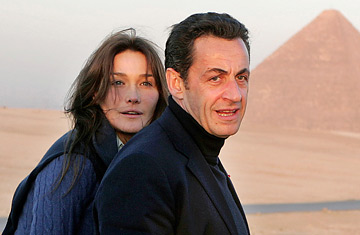
French President Nicolas Sarkozy and his girlfriend Carla Bruni
Operation "Lookit Me!" may have just hit a wall. Ever since French President Nicolas Sarkozy took office in May, leaked media reports on his private life have increasingly overshadowed political news that was often less uplifting. But French pundits and pollsters are now saying that if that preference for soft news over hard has been orchestrated by the Elysée, it is beginning to backfire. New opinion polls are showing serious erosion in Sarkozy's support — and displeasure with the overexposure of his private life — just when the news splashes that he plans to wed former super-model Carla Bruni.
The Sunday paper Journal du Dimanche ran a front-page photo of Sarkozy and Bruni together under the headline "They're Getting Married! The 9th of February?" The accompanying story offered details of the diamond-studded ring Sarkozy slipped on Bruni's finger as he proposed to her, along with an eye-batting reply that would have given even Barbara Cartland the vapors ("Monsieur le President, I have no reason to refuse you"). The story ends on a similarly schmaltzy note, promising readers, "If you loved Grace Kelly in Monaco, you'll adore Carla Bruni in the Elysée."
Or not, as it turns out. Sunday's daily Le Parisien published a new opinion poll showing Sarkozy's public approval rating had dropped seven points since December to 48%. Perhaps just as bad for the reportedly altar-bound Sarkozy, however, was that poll's finding that 48% of respondents said he overexposes his private life.
"The biggest loss of support comes among more traditional sections of society that feel the publicity surrounding the President's private affairs is undermining a presidential office designed to remain stately, dignified, and above the fray," says Stéphane Rozès, deputy director general of the CSA polling agency, which conducted the survey. Some of the decay in his standing comes from people who hadn't voted for Sarkozy in the first place, but had been initially impressed by his energetic and iconoclastic style; many apparently now feel the President's flair has done little to improve a gloomy economic outlook. But Rozès notes that areas of the largest drops — 15% among people aged 65 and over, for example — "comes in categories that habitually support the right and its candidates."
Another poll published Monday by the leftist daily Libération had some better political news for Sarkozy: a 54% approval rating marking a modest 2% decline over the previous month. But 63% of respondents to that poll agreed that the president "exposes his private life too much" — another sign that Sarkozy's luck (or strategy) of press frenzy over his intimate affairs overshadowing real political news may now be coming back to haunt him. That reversal comes just as France enters what appears to be a period of economic sluggishness in the run-up to March municipal elections that will serve as a referendum on Sarkozy's leadership.
Despite his campaign promise to become "the purchasing-power President" Sarkozy has thus far been unable to do much to address the primary concern of French citizens that they need more money in the face of higher prices. Economy Minister Christine Lagarde has announced that inflation in 2008 will probably exceed 2% — higher, in any case, than the government forecast of 1.6%, due to escalating prices of oil and foodstuffs. Laws passed to allow employees and businesses to sidestep France's 35-hour workweek limitation and heed Sarkozy's call to "work more to earn more" have largely been ignored as too complicated, and even some fellow conservatives question the wisdom of the $22 billion in tax cuts passed last July when — as Sarkozy himself acknowledged last month — "the coffers are empty". Little wonder, then, that as displeasure over Sarkozy's glitzy private life has grown, both approval and confidence indices have shrunk. Just 34% of respondents now believe Sarkozy is capable of remedying slumping purchasing power.
"People were ready to accept Sarkozy's style as symbolic of individual success, fame, and fortune so long as it held the promise of being available to everyone," Rozès explains. "The context has changed. The French are worried about the future, and this presidential style now seems out of order." All of which leaves Sarkozy's with a particularly vexing problem: how does a sitting President of France marry a famous beauty without making it into a really big deal?
